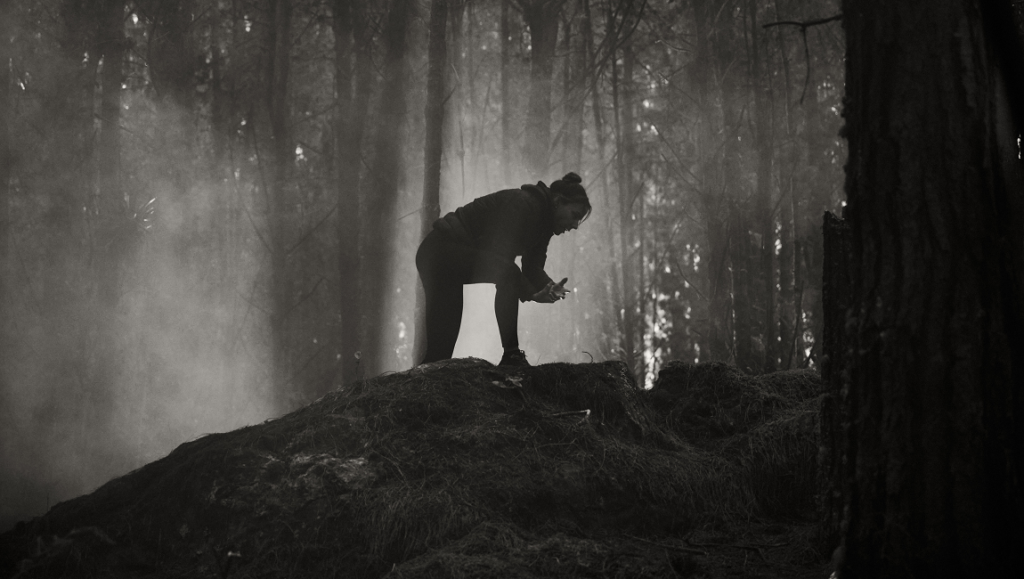Quicksand is yet another entry in the suddenly ubiquitous horror subgenre of forced couples’ therapy, where a contentious pair are placed in a diabolical — and usually claustrophobic — situation that requires them to exorcize their relationship-induced demons if they want to survive. That the majority of these scripts were born out of Covid-indued quarantine isn’t the least bit surprising, as the inability to shake one’s mate for long periods of time clearly brought a lot of simmering rage and resentment to the fore. There’s no denying that our films function as a reflection of the anxieties and fears facing society at the time of their creation, and countless studies will thus be conducted, and essays written, with regard to art as a reflection of the so-called “Covid Era.”
Quicksand has nothing to do with Covid directly, but the main couple sure act like they’ve been trapped in one another’s company for years on end. Sofia (Carolina Gaitan) and Josh (Allan Hawco) have been married for close to a decade and are ready to call it quits. She’s presented as cold and calculating, forever wielding a withering look and a barbed comeback, while he perpetually looks like someone just kicked his puppy. Both are successful surgeons and have made their way to Colombia for a medical conference hosted by their best friend, Marcos (Sebastian Eslava). After a disastrous dinner among the three in which Sofia goes out of her way to humiliate and emasculate Josh, she suddenly decides to atone for her sins by agreeing to accompany him on a hike in the nearby rainforests, even though she literally says just prior that she would rather be waterboarded with acid than go adventuring with his pathetic ass. The sudden appearance of a gun-toting thief on the main trail sends both of them hurtling into dangerous terrain that ultimately results in the pair, you guessed it, getting stuck neck-deep in the titular sludge. As they try to figure out a solution to their literal quagmire, they must confront not only the dangers inherent to the forest itself, but the reasons why their marriage failed in the first place. Is survival possible? More impossibly, what of reconciliation?
Quicksand calls to mind films like 47 Meters Down and 2010’s Frozen, tales of survival whose thrills are generated by their claustrophobic settings as well as the emotional and physical fallibility of their protagonists, grounding them in reality even as the events around them are so wholly ridiculous. These types of movies are the definition of “what would you do?” entertainment, the resulting conversations usually proving more enthralling than the features that engender them. Quicksand, however, shoots itself in the foot at minute-one by introducing two protagonists so wholly unlikeable that there’s never a moment where the viewer isn’t rooting for the forest to take them both out. So what does the forest have in store? Fire ants and a snake; that’s it. In fact, it uses the snake twice, because apparently screenwriter Matt Pitts couldn’t think of anything else. Tension is bred into the premise itself, yet director Andrés Beltrán seems to go out of his way to ensure the proceedings are as banal as possible. Beltrán could have at least had the snake appear from out of nowhere, and give the audience a good jump scare, but instead he opts to use snake-cam POV for five minutes beforehand, so that once it does finally meet our heroes, viewers will have practically fallen asleep. (And make sure to show the fire ants on a tree right before, so that we understand what is biting Sofia.)
It’s also worth noting that the script was clearly written by a man, as Sofia falls squarely into the male-defined role of “raging bitch,” presented as a woman who loves her children but resents the fact that she gave up her successful career to be a stay-at-home mom, even though her husband was willing to accept those duties himself. Josh also used to be an alcoholic, which understandably put a strain on their relationship and caused resentment to fester. But the longer the film continues, the more clear it becomes that there is no sin too small to encourage Sofia’s resentment, while Josh just accepts the abuse heaped upon him, a detail the narrative doesn’t have the wherewithal to unpack, choosing instead to render both characters as outdated and regressive stereotypes. It’s all very distasteful, and that’s even before the ludicrous ending, which takes a big swing for artsy but winds up in ‘80s network drama territory. If this is what survival looks like, maybe getting a hug from a giant snake isn’t so bad.
You can currently stream Andrés Beltrán’s Quicksand on Shudder.
Published as part of InRO Weekly — Volume 1, Issue 28.


Comments are closed.